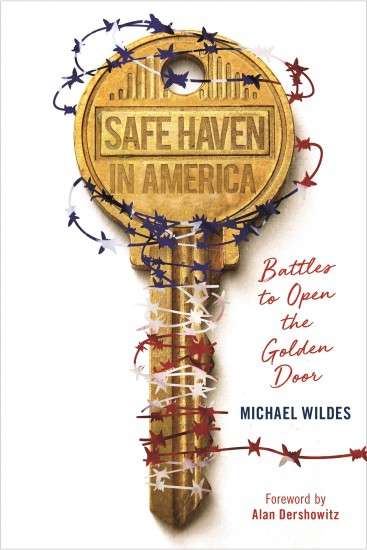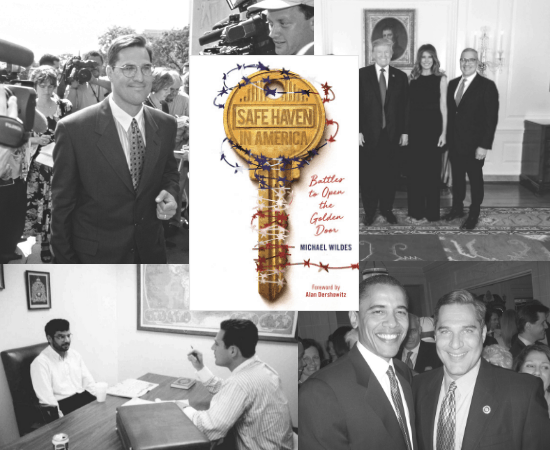Safe Haven in America by Michael Wildes
It’s a collection of immigration case histories that read more like espionage thrillers, populated with KGB agents, nuclear whistle-blowers, and even accused terrorists fighting for their lives as well as legal standing in the U.S. With the publication of Safe Haven in America: Battles to Open the Golden Door (American Bar Association), Michael Wildes, Managing Partner of the premier immigration firm Wildes and Weinberg P.C., shares nearly a quarter century on the front lines of the immigration controversy.
But he also tells human stories – children kidnapped to foreign countries in bitter divorce battles; families destroyed by the attack on the World Trade Center; a hero’s shabby treatment after standing up to terror; and more.
As Safe Haven hits the bookshelves, BookTrib asked Wildes about his experiences, his high-profile cases and clients, and his thoughts on today’s broken immigration system.
![]()
BookTrib: Your immigration cases have a very human element. Describe for us, from what you’ve seen first-hand, what coming to the United States means to your clients.
Michael Wildes: As a child I remember sitting with my father and imagining that what he did was to fulfill people’s dreams. Many people came with just the clothes on their back to our office. The more touching stories were about people who had been deported from the U.S. who we brought back.
When I interview people to work in our office, I want to know how they talk to people. The responsibilities we have are as gatekeepers, and we often feel if we don’t help them, they won’t get help. I often forget to talk about fees because working with them is just heart wrenching.
The deafening silence in Washington has caused a vacuum wherein it’s effectively made for a Wild West show in immigration law. It’s Kafkaesque political experiences that have evolved. I’m overwhelmed with the amount of personal responsibility and dignity that women have endured in many foreign countries and how they are treated and how fortunate we are in our country. America still stands as a beacon of democracy and a safe haven in the modern age.
BT: Rabbi Lord Jonathan Sacks says, “A neighbor is one we love because he or she is like us. A stranger is one we are taught to love precisely because he or she is not like us.” He notes that, in your book, you show your love for the “stranger.” Tell us why.
MW: It is hard for many to treat strangers like family. It evolved for me in my early years on a Sabbath when I would go to the synagogue and a Rebbetzin (the Rabbi’s wife) and my mother would call me over to the women’s section to talk, and they would whisper and point to a young man in the back who was not wearing a prayer shawl and seemed to be all alone. They’d ask me to ask him who he was, did he have lunch plans, did he have a wife, and more. It was my responsibility to talk to a complete stranger, and it was important to them that we be hospitable and inclusive to newcomers in our community as well as those in need.
BT: What is it like for an immigration lawyer to have to wear a bulletproof vest under his business suit?
MW: I was an auxiliary police officer and had gotten involved in very delicate situations. Officers had warned me that my clients and my life were in jeopardy. Rogue characters wanted to silence me on occasion, and when you are a public person and your address is known to the world, you don’t want to leave anything to happenstance.
I’ve had a great relationship in federal and local law enforcement, and I’d be damned if I would stand down about cases because of the risk. Sitting in restaurants with your back to the wall and getting bodyguards became routine.
BT: Describe your experience representing defecting agents.
MW: Defectors are generally less naïve clients than others. There are more people interested in keeping them quiet. I urge them never to go public with their cases. Because of the relationship that the U.S endured with Saudi Arabia, defectors we got involved with from that country were not always backed by our government due to the relationship high-level people in government had with the Saudi government. I had to learn really quickly whether my clients were credible and who were the bad guys. And sometimes I had to recognize that the bad guys were from my own country.
BT: What was it like representing Melania Trump?
MW: It was surreal. I was clear that I was a proud Democrat. I had the privilege of working with her husband before he became president on a number of issues. When I met with her, I never would have thought her husband would become president. She is a first lady of the first order. We communicate frequently and we have a very strong friendship that surpasses politics and the deteriorating dialogue of Washington.
BT: We can’t even fathom your experience representing families destroyed by the attack on the World Trade Center.
MW: As if the loss of a parent or loved one isn’t bad enough, imagine the loss of someone who is deported when his or her spouse or loved one is the citizen. Many didn’t come to my office in New York; they were afraid to come into the city after 9/11. They met me at my house instead. They didn’t want to go back because this is where they began to build their lives with their loved ones, and they wanted to continue their lives in America.
I had a press conference with a man whose wife had won the visa lottery and was so unlucky to die on 9/11. He had two young boys and was facing an embattled immigration case. I testified on Capitol Hill that if we didn’t get immigration right we could be attacked again, and they didn’t heed the call.
America’s law enforcement and intelligence communities need to have the strongest teeth as well as the most compassion. We are reacting rather than preventing these atrocities. Many of my clients became a resource to the government and became intelligence informants and assets to the intelligence community because they had a snapshot of what was going on. 9/11 was the cruelest wakeup call, which could have been prevented, and became our first experience of homicide bombers on U.S soil.
BT: What’s wrong with today’s immigration system?
MW: There’s been no creativity in creating a hinge on American’s golden doors. Our doors need to be ajar at the ready so we can open them wide for greater immigration. We want to create a safe haven for people in jeopardy to pave it forward for the next generation. We’re still enforcing laws from the 1980s from the Reagan era. A murder was done through our E-verify system and our tech is not up to par. When the bad guys have more and better tech than us, we’re in trouble.
BT: How do you compare the immigration climate today as opposed to when your firm represented John Lennon when President Nixon tried to deport him?
MW: In many ways it’s the same and worse. A lot of times the government will deny green cards due to what is found online. John Lennon would be very disappointed and would find great comfort knowing he and my father, Leon Wildes, paved the way for DACA. Who would have known that the Lennon doctrine would have an effect on millions a generation later? What dad and John did opened the door to greater opportunities for those in need.
BT: The U.S. has the highest number of international child abductions in the world. How did you help a woman whose children were abducted to Saudi Arabia push Congress to pass an international children’s abduction law and establish the Office of Children’s Concerns at the State Department?
MW: I was approached by Pat Roush [an American activist who has pioneered the issue of international child abduction and has been at the forefront of this issue as it relates to Saudi Arabia] to help. In a case from the book, Rod Rosenstein was the lead prosecutor, and it involved a woman with three beautiful daughters. When I sat with her over coffee, I learned that her brother in law had conspired with her husband and drove her daughters to the airport for this abduction. We set up a sting operation with Rosenstein. My fear was that we would only get one of the girls back, but on Mother’s Day all three girls were reunited with their mother. By bringing charges against the brother, for aiding and abetting the kidnapping, we were able to bring the girls back. I didn’t charge a nickel in that case.
Safe Haven in America: Battles to Open the Golden Door is now available to purchase.
Buy this Book!
Amazon



